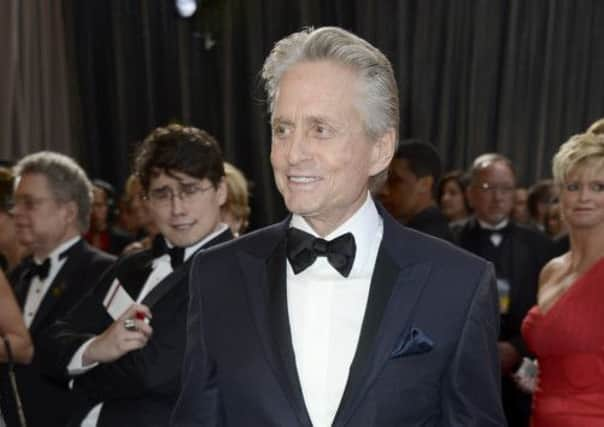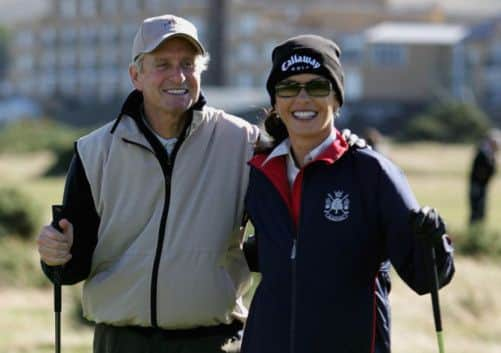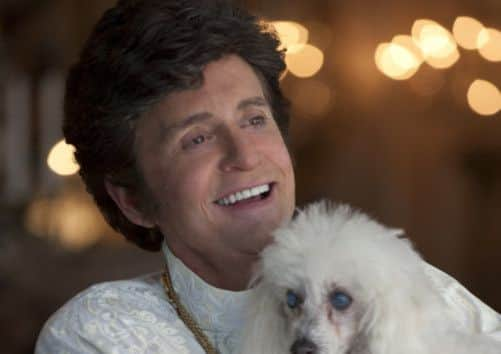Michael Douglas on life, Liberace and Local Hero


Michael Douglas doesn’t watch many movies. “To tell the truth, I prefer to watch sport,” says the 68-year-old, as he kicks back in the art deco surroundings of one of his favourite London hotels. “You can’t guess how it is going to end.”
Yet it’s hard to find a story less predictable than Douglas’ own. A second generation Hollywood actor whose fame now outstrips his famous father’s – and yet failed to bag a role in a Bill Forsyth movie. A man much mocked for making a second marriage to a starlet half his age, but built a formidable alliance that has battled both cancer and mental illness. And most recently, an avatar of troubled American ultra-masculinity, who is currently getting the best reviews of his life playing a gay pianist.
Advertisement
Hide AdOver the years many names have been mooted in connection with Lee Liberace – for years Robin Williams seemed a favourite – but when director Steven Soderbergh suggested to Douglas that he might think about donning the ermine cape, Douglas was suspicious. “We were filming Traffic at the time, where I play a drug tsar, and it occurred to me that Steven was trying to say something about my performance,” he says. “It sounds a little paranoid, but when I was doing Wall Street, the first thing Oliver Stone did was try and get a rise out of me by coming round to my trailer and saying, ‘It’s like you’ve never acted before in your life’.”


More than a decade on, Soderbergh’s more innocent inquiry turned into an inspired gamble. Capturing Liberace’s gluey charisma has been a rebirth of sorts for Douglas; at the Cannes film festival it earned rave reviews, with some suggesting it’s the best performance he’s ever given. At the festival’s press conference last week, Douglas broke down and wept. “I lost it that day,” he admits now. “There haven’t been many breaks for me recently, and the response we were getting just overwhelmed me.”
Behind the Candelabra is not only Douglas’ first film in two years, it’s also his first film since he beat cancer. He’s still a little gaunt, but chemo hasn’t diminished an enviable head of hair, pushed back and up so he looks like a venerable version of the MGM lion. Originally the film had been scheduled for 2011, but Douglas had been bothered throughout the year by a sore gum. Finally a doctor correctly identified the cause; a tumour at the base of his tongue, which turned out to be stage IV cancer. “There is no stage V,” the specialist told Douglas bluntly, and booked him for an immediate intensive course of chemotherapy and radiation. The radiation burnt the inside of his mouth and caused huge sores. He declined a feeding tube when he was warned it would affect his ability to swallow, but eating was sometimes so painful he could barely manage soup. In eight weeks he lost more than three stone.
When a second date for Behind the Candelabra came up, Soderbergh and Matt Damon, who stars opposite Douglas as Liberace’s lover Scott Thorson, both claimed they had immovable projects and asked for a postponement. “I now realise they took one look at me and realised I still wasn’t strong enough,” says Douglas. “I’m forever grateful for their tactfulness.”
However, while on the road to recovery, he practised Liberace’s careful keyboard sweep, his pussycat voice and Cheshire Cat smile. By the time Behind the Candelabra came up again, he was more than ready. At a brunch he threw for the crew the day before shooting, even 12-year-old Dylan Douglas was able to run them through Douglas’ first scene, playing a 16-bar boogie-woogie while delivering a three-page monologue to a Vegas audience. “Dylan was having fun, but Matt said later that it made him realise that I’d rehearsed to the point that everyone in my family could probably do Liberace.”


Douglas performing The Impossible Dream as a Las Vegas showstopper is emblematic of the film’s aspiration to locate the man behind the wig, rhinestones and opulent kitsch. Soderbergh’s film isn’t about how camp Liberace seemed, but how gay he really was, as seen through the eyes of Thorson, a strapping young man who meets Liberace after a gig and becomes his confidante, surrogate son and secret lover.
Advertisement
Hide AdAs a second generation Hollywood actor, Douglas met the real Liberace “many, many times” when he went out to stay with his father during the summer holidays. “He had a second home in Palm Springs and one day we were out driving and this Rolls-Royce convertible pulled up alongside him at the stop sign. He had huge sunglasses and a pearly smile. And not a hair out of place – and now I know why. I’d never seen anyone wear that much gold and diamond around his neck – they were bouncing up light reflections. So afterwards, I said, ‘Who was that?’ And my dad said, ‘Oh, that’s Liberace’.”
In the 1960s when Liberace played Las Vegas he was earning more than Elvis, and in Hollywood he was a member of the Hollywood party circuit, a well-liked and generous host. “My dad and his friends talked warmly about Liberace as a great guy – although they tried to invite him without his boyfriends, who were numerous and came and went. Lee was kind and goodhearted – which was one of the reasons I was attracted to the role – I don’t play many nice people.”
Advertisement
Hide AdNarcissistic, manipulative and self-deluded, I’m not sure Liberace comes across as exactly nice in Candelabra, but Douglas certainly puts himself out there. It’s hard to think of many actors at his level who would loom over Matt Damon first thing in the morning with a satyr’s smile, or recreate Liberace’s taut plastic surgery, which left him unable to close his eyes when asleep. Maybe Hoffman. Possibly Nicholson. “Oh, I haven’t seen Jack go gay yet,” snorts Douglas.
The movie is coming out, as it were, at a time when gay rights are on the march, yet despite Douglas’ gift for picking zeitgeist projects in the past, the film’s sexual content made film studios nervous. “It wasn’t their only issue, but apparently they felt only gay people would go see our movie,” says Douglas, acidly. Some of the wealth of detail in the movie also pushed the certification to a 15; in the days before Viagra, apparently Liberace had a silicone implant in his penis to ensure erection. So despite being made for around £15m with two big names attached, every studio passed on distributing the movie until HBO decided to make a deal. In America, it goes to cable TV, while the rest of the world can see Damon’s gemstone swimming costume on a ten-foot screen.
Douglas used to tease Damon before kissing scenes – “so, Matt, which flavour of lip balm would you like today?” – but he sees Liberace and Thorson’s descent from romantic idyll to domestic squabbling as a universal theme. As is the rather conscious way the starry Liberace uses his showbiz dazzle to draw in Thorson. Did Douglas ever consciously use his movie star shimmer to pull women when he was single? “Oh, that was such a long time ago, I can’t remember,” he demurs. So did you just stay home for five years between marriages? He grins, sheepishly. “Uh. Well ladies who know you are recently divorced don’t put much pressure on you, is what I discovered. And I couldn’t believe how honest you could be. Apparently as long as you didn’t date two of them in the same town at the same time, they would forgive you.”
By all accounts, after a messy divorce from Diandra Douglas, he had parked the idea of matrimony – until he met Catherine Zeta-Jones. “I certainly didn’t want to be alone for the rest of my life, but I also wasn’t looking for anything serious at that point. Then I saw this beautiful woman in Mask Of Zorro, and Melanie Griffith and Antonio Banderas introduced us at the Deauville Film Festival. That was the night I said I wanted to be the father of her children. The very next day, she left for the Isle of Mull to film Entrapment with Sean Connery. And I had no idea how she felt about my behaviour, so I had roses sent to Mull. Don’t ask me how, but they arrived before she did. Catherine says the first thing she was told by the woman at her hotel was, ‘Och, you’ll never believe it but we’ve got flowers for you from Michael Douglas’.”
The relationship blossomed, and was subjected to hypertrophic levels of press interest. When Zeta-Jones gave birth to their first child, Dylan, they couldn’t use baby monitors because someone outside would tune into the frequency to listen to conversations inside the house.
They renewed their vows in 2010 and, second time around, Douglas has consciously spent more time enjoying domestic life with Dylan, 12, and Carys, ten. During his first marriage, he admits his priorities mirrored his father, who was frequently absent. He also had a tussle with alcohol abuse in 1992, and went into rehab, incorrectly generating the rumour that he was being treated for sex addiction. “It hurt my wife at the time, and also my son,” he says.
Advertisement
Hide AdThat son, Cameron, started experimenting with drugs when he was 13, and, aged 34, he’s currently in jail for dealing cocaine and methamphetamine. The sentence was extended in 2011 when he was discovered to have drugs in prison, and he failed another drug test this January. He’s currently in solitary confinement for 11 months, with family visits denied for two years. “I feel he served to the point that he was a drug dealer and a drug addict, but it’s now reached the point of no return,” says his father, who had at one point encouraged Cameron to follow him into acting by casting him with himself and his father in a 2003 movie called All In The Family. “Right now I cannot see my son. I’m not allowed to see him – and I’m not sure how that helps him, or me, as part of his punishment.”
At this point, most interviewees would politely close the door on their family problems, but this week Zeta-Jones came home after a month in rehab for bipolar disorder. Douglas has just spoken to her on the phone and can’t help sounding relieved. “Catherine is fine. It was a medical issue and she’s home in New York and doing great. Sometimes if you are bipolar and feel OK, you say, ‘Oh, I don’t really need this stuff’, and at that point she was in trouble. I’m glad she’s home, and in a wider sense I’d say to all bipolar people out there to check with your doctor before you take it upon yourself to change your medication.”
Advertisement
Hide AdDouglas is philosophical about this kind of interest – “people want to know if you’re OK” - but at times he must long for the kind of shelter he enjoyed growing up as the son of Kirk Douglas. Kirk and his first wife Diana split up when Michael was six, leaving the older Douglas a distant, slightly intimidating presence.
Michael and his brother Joel stayed with their mother in Connecticut, but would visit Kirk and his second wife Anne in Beverley Hills during the summer holidays. His father was at the peak of his powers with movies such as Spartacus, Lust for Life and Paths of Glory, and when he was nine, he went to see his father on the set of The Bad and the Beautiful. “He was filming a big romantic scene with Lana Turner,” recalls Douglas. “He was holding her hair, and then he kissed her. I remember it so clearly. And the next minute he looked up and waved me to move away, because I was in his sight line, but the intensity of that moment struck a chord with me.”
His parents would have preferred him to become a lawyer, but movies were always within his radar. His date on his 16th birthday was child star Hayley Mills; he had a holiday job at one of the studios and used to watch them edit Psycho on his lunchbreak. When his mother remonstrated about the state of his teenage bedroom, the Hollywood prince retorted, “Well, Dad has a butler to pick up his socks.”
Yet it took him years to get the same respect as his father as an actor. A string of sensitive young male leads in films such as Hail Hero! And Adam at 6am did not make much of an impression, and when he eventually came to fame at 31, it was as the Oscar-winning producer of One Flew Over the Cuckoo’s Nest, a project his father had passed to him after buying the rights to the book. Douglas cast Jack Nicholson in the lead instead of his dad, but the pair shared the profits. “I like to remind him that he ended up making more money off that movie than he did on any other picture.”
Films like The China Syndrome and War of The Roses suggested he had a good eye for water- cooler topical pictures as a producer, but as an actor he still wasn’t the automatic choice for film directors. For instance, after reading the script for Local Hero in the early 1980s, Douglas pitched hard for the role of MacIntyre, the American executive who falls in love with Scotland. “The director, Bill Forsyth, wouldn’t have me and turned me down,” he says, animatedly. “I begged Bill, because it was a wonderful script, but he just didn’t want me. Maybe it was because I was seen as a TV actor then, with Streets of San Francisco – and up till then only Clint Eastwood and Steve McQueen had crossed from TV into movies. I still think I could have made a good MacIntyre – but he gave it to Peter Riegert instead. And it’s still a lovely film.”
It wasn’t until the late 1980s that Douglas found his place as a cutting-edge movie star in morally ambiguous roles. He became a slick box office commodity with his Oscar-winning performance as Gordon Gekko in Wall Street, and affixed his stamp to the kind of flawed US male who thought he could sleep with Glenn Close and not suffer the consequences of her rage in the emotionally manipulative Fatal Attraction. Yet not everyone rates these films – or Liberace – as his best work. His daughter Carys still tells Douglas that Romancing the Stone is her favourite of all his films (“No, she has not seen Basic Instinct”). Worse: although Dylan also enjoys Stone, Douglas’s rascally adventurer is only his second favourite character in the film. “Dylan is all about Danny DeVito in that film. In fact, one year for his birthday I got Danny to speak to him on the phone, and my son had tears in his eyes. Tears. Because he was talking to Danny DeVito.” Douglas does a magnificent movie diva expression of outrage. “What was I – chopped liver?” n
Twitter: @SiobhanSynnott
Behind the Candelabra is released on Friday